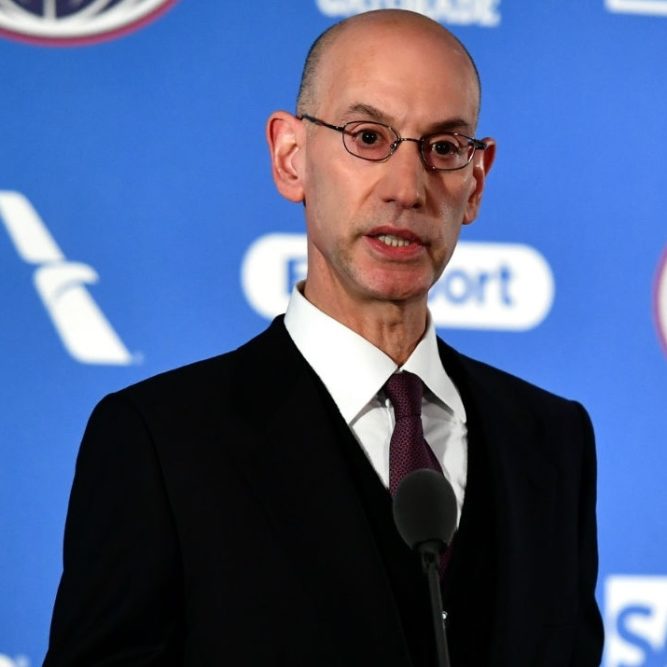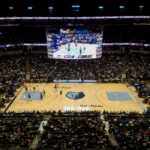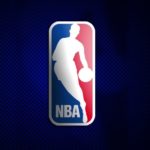
The NBA’s odd existence in the United Kingdom got a touch of stability earlier in the week due to its new deal with Sky. Emmet Ryan on how the NBA is everything always on the edge of being nothing and needs to be somewhere in-between
Channel 4 realised one thing about the sports rights it had in the early 1990s. It needed to somehow let the sports speak for themselves while making the presentation about more than just the sports. A game in Serie A football was presented as a standalone product but the rights were defined by Gazetta Football Italia, the Saturday morning magazine show presented by James Richardson that was as much a lifestyle show as anything. The NFL condensed game on a Monday night was presented purely as action but Blitz, the magazine show fronted by Gary Imlach, was an observation of American culture.
For the life of me the names of the chaps that presented the NBA shows on Channel 4 escape me, probably because there was more than one and 14 year old me only cared that they were cool, but their purpose doesn’t. The mid 1990s saw Channel 4 jump on the association with the same approach as the other curiosities in its package
The arrival of pay sports TV in the 1990s changed the shape of sports on all television to an incomprehensible level. Sky essentially made all the big ticket items they could their own, managed to turn a few sports into big ticket items, and the dozen games a year (yes that’s all their were) of England’s top flight were gone from free TV. A public unfamiliar with mass availability of live sport suddenly had lost the bit it was getting.
By accident. Channel 4 suddenly became one of the more significant broadcasters in sports despite being clearly focused more from its birth as being the oddball* channel for more cultured matters. The success of the NFL on the station was in part down to a dispute between English football and the BBC, which prevented cameras from going into grounds for Match of the Day in the mid 80s. Those looking for a sporting fix switched over to the new station and saw men in pads hitting each other.
*One of Channel 4’s other sporting offerings was Kabaddi and, unknown to us watching at the time, it wasn’t even the big leagues. Kabaddi is unquestionably cool and everyone should watch it.
The NBA’s moment in the sun with the British public had been the 1992 Olympics. Basketball had an aura of cool about it but the Dream Team cemented it. With rap music’s relevance growing in Britain, and that may be the whitest thing I ever write, the time was perfect for Channel 4. With Gazetta, born out of Paul Gascoigne going to Lazio, it went for a refined but self-deprecating vibe while the NBA enabled it to be with the tone of the time.
For our analysis series The Ballin After, post-game interviews, and more, subscribe to BallinEurope’s YouTube channel
Shows didn’t just come with hip hop soundtracks, the track list was up at the end of the show in a deliberately accentuated font. The culture of what was going on was there as much as the sport. Even across the Irish sea, it was clear that all of mainstream British basketball’s attitude involved understanding what made the NBA appeal to young people there.
Basketball is a popular sport in Britain but the NBA is the primary source of that interest which is hard to reconcile with the pretty solid player numbers. Getting NBA fans in the UK to care about the sport growing there to be ‘cool’ is tough because cool itself is difficult to manufacture, there needs to be an organic element to it.
That made wanting the rights to the NBA a natural target for any broadcaster. Sky swooped and cemented its place as the home of American sports in the UK. Consumption of the product however was more challenging and one successive rights holders have struggled terribly with.
The bulk of the NFL season is at as sweet a spot in the British TV schedule as it gets. Teatime through bedtime on a Sunday is not competitive but a live sport with built in breaks is just made for young parents looking to enjoy their last bit of respite before the week begins anew. Having far fewer games also makes the NFL much easier for those viewers to follow and there’s an obvious import around them.
The NBA has an 82 game schedule, the Sunday slate was the only thing other than MLK Day remotely suited to being a standard ‘this is when you watch’ slot but its context was confusing with the rest of the sport as lots could change in the week between time slot friendly games. The playoffs were for the most part at hours unsuited to the audience and there was no Super Bowl, no single game to build the year’s narrative around. All of that is bad for selling a product but then there’s also the consumer who is far less likely to commit to a single game of the week format.
So the NBA remained popular in Britain but the distributors of it got little out of it. The NBA London game arrived and it took off big despite some really irrelevant match-ups, a pair of games between the 2011 Raptors and Nets (22-60 and 24-58 records respectively) to kick things off being the nadir, to re-emphasise that the NBA had value. BT Sport jumped on the deal as it looked to fill out its schedule with content that had a brand-loyal following. It was beginning its broadcast war with Sky and the rights were basically in the ether, there was no holder as Sky had shown no real interest in retention, and BT was able to package it along with UFC and Moto GP as products that had niche but sticky audiences. It was a good launchpad before they got the football rights they need to financially hurt Sky badly.
BallinEurope now has merch, like actual merch, t-shirts, phone covers, and even pillows. Check it all out on our RedBubble page.
It was a long war over telecoms and broadband where sports rights were the proxy, I wrote a lot about it in my day job as a tech journalist, and the end result was a crushing victory for BT which has subsequently started withdrawing from the field having got what it wanted. BT dropped Serie A football and UFC, although it managed to get the Nurmagomedov vs McGregor fight in the last month of its deal, both of which were picked up by Eleven Sports.
The digital platform was never going to be a real contender for the NBA rights as the question the NBA now wants answered is different. Through International League Pass, it can get the games it wants to everyone who cares online. It had built up a partnership with GiveMeSport to deliver NBA.com with specific content for the UK. That ended but now the NBA seems to have the form of the answer it wants. That’s a really weird sentence but it needs to be.
The NBA wants new eyeballs or at least those less committed than the hardcore who are open to caring. Sky is a better bet than Eleven Sports because more people just happen to have Sky and the NBA has put more games on at European friendly times on weekends. It wanted a TV partner, not just a broadcast partner. Within that, it’s also gotten the content partner in the four year deal so Sky will fill the hole GiveMeSport had.
The good news is, it has the broadcast and content coordinated from one source. The tough part is working out who the NBA is looking to talk to and ensuring Sky is on the same page. The association knows its hardcore has multiple sources and will find ways to access the conventional NBA.com content. GDPR is a bigger concern for reaching those users than a partner providing alternative content. How it brings new users on the journey is a different matter altogether.
For a load of people, the next time they engage with the NBA will be the first time they have done so in a manner that was more than cursory. For another large chunk, outside of the hardcore, being treated like absolute newcomers will get irritating in a hurry. The content arc and how it reaches the end user needs to be smarter. Some of this is going to involve good user of AI for end user customisation, a lot more of it is going to require having editors who are intelligent and committed in sorting out the content that works. There are notable free agents out there, particularly post GiveMeSport, who should be pursued aggressively but the overall structure needs major time and resources put into it. To make this work, to make it a partnership that matters, the NBA needs to work out the end goal and work backwards along every step required to get there. It also needs to make sure Sky is on board and that it’s worth Sky’s while.
London and the UK has long been the white whale for Euroleague and international hoops as a whole. The BBL definitely has its base, albeit one that could be better, but the story of basketball in Britain starts with the NBA. It’s got a cultural relevance aided by the sport, its gestalt sells. Working out how to sell it is the challenge.
To keep up to date with everything on BiE, like BallinEurope on Facebook



Leave a Reply